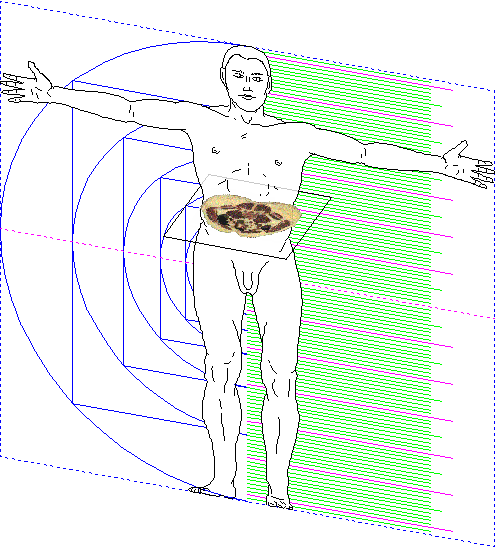2005.07.15 Blobfest
2005.07.16 15:20
mcmansions and the american architect
Moravia or BUST!
 
Blicks von Moravia
2004.06.13
2005.07.17 14:00
The Semiology of God
The wounds of Christ's crucifixion are significant in their corporal extreme-ness -- the nailed hands and feet, the crown of thrones, and ultimately a stab directed at the heart. Note how Christ's first wound, the circumcision, occurs also at an extreme point. Like the alpha and the omega, Christ is all about extremes.
When it comes to signs of God, nooses and gurneys are nothing but empty signifiers.
2005.07.17 16:20
The Semiology of God
Wasn't there also originally a similar column that supported a statue of Helena?
Constantinople was dedicated as the new Christian capital of the Roman Empire, not a new Byzantine capital.
As to the appearance of the cross in first-third century Roman catacombs, they specifically signified the dead presence of Christian martyrs.
2005.07.17 16:24
The Semiology of God
Only part of the Holy Cross went to Constantinople. Most of it stayed at Jerusalem, specifically at the Church of the Holy Sepulcher, and part of it went to Rome and is still within the Helena chapel at Santa Croce in Gerusalemme, as is half of the titulus, the sign on the Cross.
2005.07.17 17:22
The Semiology of God
Helena was buried at Rome a day of two before 3 August 326, subsequent to her death 25 July 326, probably at Naples.
I have spent a good deal of time over the last six years gathering multitudinous data relative to the life of Helena, so single quotations mean very little to me. There are a lot of contradictions within modern Helena scholarship, and it has been exactly the contradictions that I have striven to understand and hopefully ultimately resolve.
One major aspect of the Helena's legend which has eluded modern scholarship is that a law of silence regarding Helena and the Cross was in force when Eusebius wrote of Helena in the Holy Land within his Life of Constantine (337). Ambrose, bishop of Milan, broke the silence regarding Helena and the Cross in his Obit Theodosi, the Obituary of Emperor Theodosius (25 February 395). The law of silence regarding Helena and the Cross was suggested immediately after the death of Helena to Constantine by Eutropia, and the reason for this law was so that overall power would stay within the Imperial ranks, rather than go to the Christian priesthood which then had a new sign, the True Cross, to confirm its power.
| |
2005.07.17 18:24
The Semiology of God
18 September 324 - Constantine defeats Licinius at Chrysopolis and in turn becomes sole ruler of the Roman Empire.
8 November 324 - Constantine founds Constantinople
25 July 325 - the Nicene Creed and conclusion of the Nicene Council, over which Constantine precided.
25 July 325 also marked the beginning of Constantine's 20th year as a Roman Augustus. It is fairly certain that Helena also attended the Nicene Council.
14 September 325 - Helena finds the Holy Cross at Jerusalem.
25 July 326 - the closing ceremonies of Constantine's 20th jubilee year at Rome. The death of Helena and the suicide of Fausta, Constantine's second wife (at Naples and Rome respectively).
3 August 326 - Constantine leaves Rome and never returns.
11 May 330 - dedication of Constantinople.
22 May 337 - death of Constantine at Nicomedia.
During Constantine's 20th jubilee year, his movements throughout the Empire were a gradual moving toward Rome over land--Greece, the Balkens, northern Italy. During the same period, Helena likely moved toward Rome via north Africa, ultimately crossing to Italy from Carthage.
2005.07.18 15:26
"I'm a believer": author of 'the Da Vinci Code' defends marriage of Christ theory
Brown wrote The Da Vinci Code in a fashion that makes it easy to then turn the text into a screenplay. Overhyped mediocre imagination.
2005.07.19 12:27
Celestine dream
Wasn't that book really about a lot of people getting high on pot and then thinking grand thoughts?
One of my favorite sentences of all time comes from the entry under 'Celestine the Fifth, pope' in The Penguin Dictionary of Saints: "The results were disastrous, for Celestine was unfitted for the papal office in every respect except his holiness."
2005.07.19 13:00
Separated at Birth?
Does anyone else remember that the first title of Wig Nut and Wig Not is All those "separated at birth" gags are destined to become a poignant part of turn-of-the-millennium art history, or at least that's what fictitious fashion voyeur Dick Hertz said?
2005.07.19 13:14
The Semiology of God
The emperor Alexander Severus at one point wished to include Jesus Christ among the pantheon of Roman gods, however, Alexander was advised against the Christian inclusion because of the quick realization that almost everyone in Rome would then openly become a Christian, and subsequently completely undermine Rome's pagan priesthood and aristocratic power-base. Evidently, by the first half of the third century, Christianity was already Rome's predominant faith, and given that Alexander's wish occurred close to a hundred years prior to the emperor Constantine's allowance and erection of Christian tombs and basilicas within Rome, the non-eventuality of Alexander's desire is nonetheless a pivotal point that signals the beginning of paganism's end. It is thus not for nothing that Piranesi, rather than position the Porticus Alexandri Severi correctly at the beginning of the Equiria, chooses to place Alexander's porticus at the Equiria's end.
--excerpt from Encyclopedia Ichnographica, 1998.12.01
| |
2005.07.19 14:24
Celestine dream
Look who's with Celestine V.
2005.07.19 17:39
I am architecture.

The Timepiece gauge with the plane of the present positioned at anno 1543 and manifesting the transverse section of the body through the navel.
|